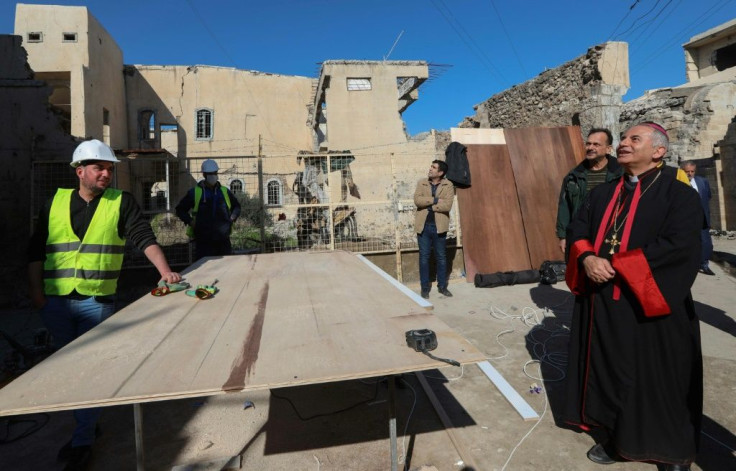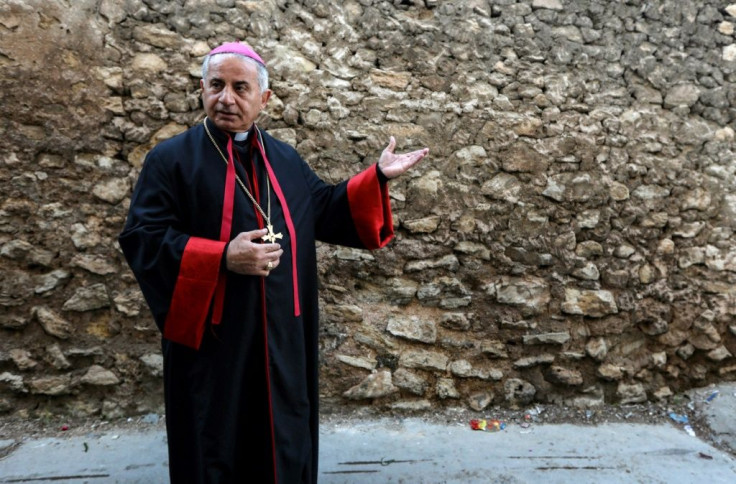Amid Scars Of War, Iraqi Archbishop Readies For Pope
From Mosul's rubble-strewn streets to ancient churches at Karamlesh, badly damaged by the Islamic State group, Archbishop Najeeb Michaeel is preparing for the first-ever papal visit to Iraq.
Amid the cleanup and reconstruction, the priest has ensured some scars of war from IS's brutal campaign remain -- a broken chalice, a smashed cross on a church bell tower -- to remember the horrors the Christians of Iraq's Nineveh plains have survived.
"We forgive, without forgetting," said Michaeel, the Chaldean Catholic Archbishop of Mosul, as he visited Karamlesh and other war-ravaged Christian villages of northern Iraq.
"But the most important thing is that joy enters the hearts of all, because this is not a simple formal visit -- it is a spiritual moment," he said with an infectious smile.

Since he learnt that Pope Francis would visit Iraq in March, the clergyman has seen his workload double.
"We're under enormous pressure: the Holy Father is not your average person -- he's the representative of a state and of all Catholics worldwide," Michaeel told AFP.
Pope Francis has previously shied away from using bullet-proof vehicles in favour of a more open "popemobile", the better to meet people, but that may be difficult in a country where security threats still linger.

Aged 84, he may also struggle to make his way through the uneven pavements and debris-filled alleyways of Mosul.
"Everyone is going to want to get close to him, so it's a huge job," said Michaeel. "All security officials are going to be on their toes."
Michaeel checks on preparations by local choirs and scout troops.
He also coordinates with priests who will translate masses between Latin, Arabic, Italian and a form of Aramaic, the ancient language of Jesus Christ, that is still spoken in Iraq's north.
It will be a first for the pope, too, as he will preside over his first-ever liturgy in the Eastern rite.

There is no cathedral or stadium large enough to hold the numbers of worshippers expected to turn up for a mass in Nineveh province, but authorities are working on a possible open-air venue.
In the interim, Michaeel is checking on more than a dozen churches -- many dating back to the 5th and 6th centuries -- that remain in ruins.
One is Miskinta Church, still heavily damaged, but the worst is the church of Saint Simon, its stone walls collapsing and its crypts filled with rubble and rubbish.
Michaeel, a native of Mosul, a melting pot of Iraq's diverse ethnic and religious communities, worked as an oil engineer before he answered a calling to join the Church.
He is well known for his work in 2014 saving hundreds of rare manuscripts and scrolls by piling them into his car as IS was approaching.
Now, Michaeel wants to show the pope the beauty of Iraq's patchwork of minorities.
"This country is a mosaic of a thousand colours, and you can't leave it broken apart the way it is today," he said.
Michaeel told AFP that the pope's "strong words, his blessing, and his moral support" would help bring communities back together.
It is a view that lies at the heart of the pope's visit, especially when he holds inter-religious prayers at the ancient city of Ur in Iraq's south.
It is the site where Abraham, the father of three religions -- Judaism, Christianity and Islam -- is thought to have been born.
The pope's prayers will bring Christians and Muslims together, as well as the faithful from the ancient religions of the Yazidis and Sabeans.
"This tour across Iraq is extremely important," said Michaeel. "Not just for Christians but for all Iraqis."
© Copyright AFP {{Year}}. All rights reserved.





















